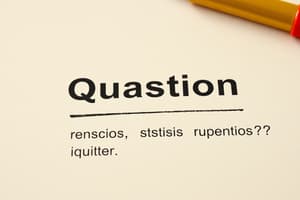Podcast
Questions and Answers
What Spanish word is used to ask 'who'?
What Spanish word is used to ask 'who'?
¿Quién?
Translate 'when' into Spanish.
Translate 'when' into Spanish.
¿Cuándo?
What is the Spanish term for 'where'?
What is the Spanish term for 'where'?
¿Dónde?
How do you ask 'how' in Spanish?
How do you ask 'how' in Spanish?
What is the Spanish equivalent of 'why'?
What is the Spanish equivalent of 'why'?
What is the purpose of using the word '¿Para qué?' in a conversation?
What is the purpose of using the word '¿Para qué?' in a conversation?
How would you use '¿Cuánto/a/os/as?' appropriately in a question?
How would you use '¿Cuánto/a/os/as?' appropriately in a question?
In what context would you use '¿Cuál/es?' in conversation?
In what context would you use '¿Cuál/es?' in conversation?
What type of information does '¿Hay?' seek in a discussion?
What type of information does '¿Hay?' seek in a discussion?
What does '¿Qué?' typically ask about in a conversation?
What does '¿Qué?' typically ask about in a conversation?
What is the negative form of 'some' in Spanish?
What is the negative form of 'some' in Spanish?
How does 'alguno' change before a masculine singular noun?
How does 'alguno' change before a masculine singular noun?
What are two ways to express 'never' in Spanish?
What are two ways to express 'never' in Spanish?
When using 'ninguno' or 'ninguna,' which form is typically used?
When using 'ninguno' or 'ninguna,' which form is typically used?
How would you respond to '¿Tienes algunas sillas?' if you have none?
How would you respond to '¿Tienes algunas sillas?' if you have none?
Translate 'Nobody is in the house at the moment' into Spanish.
Translate 'Nobody is in the house at the moment' into Spanish.
What is the Spanish translation for 'I can't paint or draw'?
What is the Spanish translation for 'I can't paint or draw'?
How do you say 'There is nothing better than a pretty smile' in Spanish?
How do you say 'There is nothing better than a pretty smile' in Spanish?
Translate the phrase 'I will not return to this place in the future' into Spanish.
Translate the phrase 'I will not return to this place in the future' into Spanish.
What is the translation in Spanish for 'Do you have a pen?'
What is the translation in Spanish for 'Do you have a pen?'
What is the correct Spanish translation for 'I don’t love vegetables'?
What is the correct Spanish translation for 'I don’t love vegetables'?
How would you translate 'I can't paint or draw' into Spanish?
How would you translate 'I can't paint or draw' into Spanish?
Translate 'Was it sunny yesterday?' into Spanish.
Translate 'Was it sunny yesterday?' into Spanish.
What is the Spanish phrase for 'There is nothing better than a pretty smile'?
What is the Spanish phrase for 'There is nothing better than a pretty smile'?
Translate 'Nobody is in the house at the moment' into Spanish.
Translate 'Nobody is in the house at the moment' into Spanish.
Flashcards are hidden until you start studying
Study Notes
Interrogative Pronouns and Adverbs in Spanish
- ¿Quién? - Asks about a person; translates to "Who?" in English.
- ¿Cuándo? - Inquires about time; translates to "When?".
- ¿Dónde? - Seeks information about place; translates to "Where?".
- ¿Cómo? - Requests clarification on manner or method; translates to "How?".
- ¿Por qué? - Asks for reason or explanation; translates to "Why?".
- ¿Para qué? - Seeks purpose or intention; translates to "For what?".
- ¿Hay? - Inquires about existence; translates to "Is/are there?".
- ¿Qué? - General question about information; translates to "What?".
- ¿Cuánto/a/os/as? - Asks about quantity; translates to "How many/much?".
- ¿Cuál/es? - Requests specific options or choices; translates to "Which/what?".
Usage in Questions
- These interrogative words are essential in forming questions in Spanish, allowing for detailed inquiries across various contexts.
- They are used to gather specific information, generate dialogue, and facilitate understanding in conversations.
Key Spanish Negatives
- Ninguno/a/os/as translates to "none" or "not any".
- Nadie means "nobody" or "not anyone".
- Nada means "nothing" or "not anything".
- Tampoco means "neither" or "not either".
- Nunca / jamás translates to "never".
- Ni...ni is used for "neither" or "nor".
Agreement and Usage
- Ninguno changes form based on the noun's gender and number.
- Alguno and ninguno drop the -o before a masculine singular noun.
- Example: "¿Tienes algún libro?" (Do you have a book?)
- Response: "No, no tengo ningún libro." (No, I don’t have any book.)
Singular Form Preference
- Ninguno/ninguna is typically used in the singular form.
- Example: "¿Tienes algunas sillas?" (Are there any chairs?)
- Response: "No, no tengo ninguna." (No, there is none.)
- For rooms: "¿Hay algunos cuartos disponibles?" (Are there any rooms available?)
- Response: "No, no hay ninguno." (No, there is none.)
Spanish Translations
- "No, there isn’t any food for the dog." translates to "No, no hay comida para el perro."
- "Nobody is in the house at the moment." translates to "Nadie está en la casa ahora."
- "I don’t love vegetables." translates to "No me encantan las verduras."
- "Do you have a pen?" translates to "¿Tienes algún bolígrafo?"
- "I can't paint or draw." translates to "No puedo pintar ni dibujar."
- "There is nothing better than a pretty smile." translates to "No hay nada mejor que una sonrisa bonita."
- "I will never drink alcohol." translates to "Nunca voy a beber alcohol."
- "Can you tell me the truth please?" translates to "¿Puedes decirme la verdad por favor?"
- "Was it sunny yesterday?" translates to "¿Hacía sol ayer?"
- "I will not return to this place in the future." translates to "No volveré a este sitio en el futuro."
Contextual Notes
- Focus on negation in Spanish using "no."
- Recognize the verb forms: "encantar" indicates a strong liking, often used in the context of food.
- Use of "algún" (some) indicates the indefinite nature of the object mentioned.
- "No puedo" as a common structure to indicate inability.
- Emphasize cultural context: expressions about alcohol may reflect personal choices or cultural norms surrounding drinking.
- Questions in Spanish often use inverted punctuation marks (¿?) at the beginning.
Spanish Translations
- "No, there isn’t any food for the dog." translates to "No, no hay comida para el perro."
- "Nobody is in the house at the moment." translates to "Nadie está en la casa ahora."
- "I don’t love vegetables." translates to "No me encantan las verduras."
- "Do you have a pen?" translates to "¿Tienes algún bolígrafo?"
- "I can't paint or draw." translates to "No puedo pintar ni dibujar."
- "There is nothing better than a pretty smile." translates to "No hay nada mejor que una sonrisa bonita."
- "I will never drink alcohol." translates to "Nunca voy a beber alcohol."
- "Can you tell me the truth please?" translates to "¿Puedes decirme la verdad por favor?"
- "Was it sunny yesterday?" translates to "¿Hacía sol ayer?"
- "I will not return to this place in the future." translates to "No volveré a este sitio en el futuro."
Contextual Notes
- Focus on negation in Spanish using "no."
- Recognize the verb forms: "encantar" indicates a strong liking, often used in the context of food.
- Use of "algún" (some) indicates the indefinite nature of the object mentioned.
- "No puedo" as a common structure to indicate inability.
- Emphasize cultural context: expressions about alcohol may reflect personal choices or cultural norms surrounding drinking.
- Questions in Spanish often use inverted punctuation marks (¿?) at the beginning.
Studying That Suits You
Use AI to generate personalized quizzes and flashcards to suit your learning preferences.




